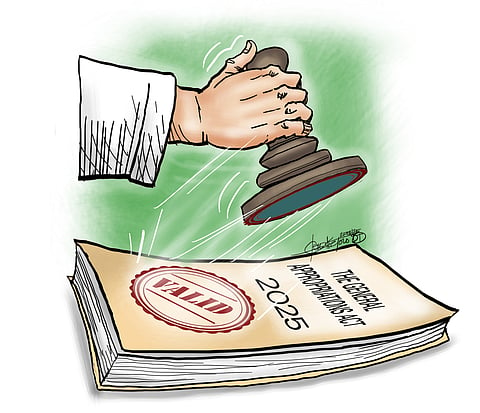
- NEWS
- the EDIT
- COMMENTARY
- BUSINESS
- LIFE
- SHOW
- ACTION
- GLOBAL GOALS
- SNAPS
- DYARYO TIRADA
- MORE

The General Appropriations Act (GAA) stands and is binding despite its defects, which Congress and the Executive should address to restore sanctity to the yearly budget process.
Questions regarding the drafting of the budget bill were raised with the Supreme Court (SC), which will help clarify the law’s provisions. However, the tribunal is not expected to interfere in a process reserved for the Executive and Legislative branches.
President Ferdinand Marcos Jr. said the move to challenge the constitutionality of the 2025 GAA could be considered an act to destabilize the government, as he asserted that the enrolled bill he signed was complete.
Davao City Representative Isidro Ungab has questioned the blank items in the Bicameral Conference Committee report on the budget bill signed by members of the body.
It was one of the issues in the complaint against the GAA filed with the tribunal.
Marcos reminded his critics about the implications of their actions.
“We shut down everything. I guess that’s what they want. They want the government to cease working so their destabilization efforts will continue.”
The President was correct in saying there were no blanks in the printed enrolled copy he signed.
Former Senate President Frank Drilon said the GAA is the controlling document and not the Bicameral Conference Committee report, which was pockmarked with blank items.
“I don’t know what happened after the incomplete report came out. They could have talked with the technical staff for the adjustments. The General Appropriations Bill (GAB), however, was ratified by the Senate President and the Speaker of the House,” he explained.
Drilon said the ratification by Congress leaders was the seal of validity of the document, one that neither the President nor the Supreme Court Chief Justice could intervene upon.
“There is a certification by the leaders of both chambers of Congress that the budget process, based on the Constitution, was followed with the signing of the enrolled copy,” Drilon, who has 24 years of experience in Congress tucked under his belt, said.
He stressed that the GAA is binding on everyone and that “even the President cannot interfere and say that there were blanks in the Bicam report.”
“I know Ungab, and he knows what he is talking about,” he said. “Nonetheless, Drilon indicated that the GAA is valid and that it would be difficult for the SC to reverse the process of its approval.”
The so-called blank items in the signed Bicam report will not be enough reason to compromise the GAA, based on Drilon’s view as a lawyer and legislator.
“In my professional judgment as a lawyer and with 24 years in Congress reviewing the annual GAA, there is no basis to invalidate the law.”
Unfortunately, it is being exploited for political purposes, he lamented, adding that in his assessment, the GAA will be sustained by the SC.
Drilon said there is a justiciable issue that the SC must resolve, which is the question of the Constitution not being followed regarding the Department of Public Works and Highways having a bigger allocation in the budget compared to the Department of Education.
The Charter specifically prescribes that Education should get priority in yearly allocations.
“That could be the basis of the budget law violating the Charter and not the blanks in the Bicam report.”
“Assuming that the Bicam report had blanks in it, still, the controlling document is the printed enrolled copy, which is the one signed by the President,” Drilon stated.
“The President does not have the authority to look beyond the certification given by the leaders of both chambers of Congress,” the veteran legislator added.
“The certification is binding even with the SC because of the principle of separation of powers.”
The blanks are immaterial as long as the enrolled bill is complete, Drilon said.
In giving the public a clearer view of the budget process, a discussion in the SC of the yearly ritual in Congress will be invaluable, as long as the arguments are not hijacked by candidates in the May polls.
